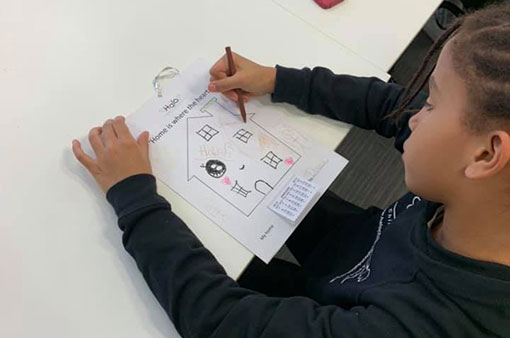Sudden Loss
Halo is a children’s foundation that supports children and their families with bereavement.

In both sudden death and anticipated death, there is pain. However, while the grief is not greater in sudden death, the capacity to cope is diminished. Grievers are shocked and stunned by the sudden loss of their loved one. The loss is so disruptive that recovery almost always is complicated. This because the adaptive capacities are so severely assaulted and the ability to cope is so critically injured that functioning is seriously impaired. Grievers are overwhelmed.
If you are such a griever, you probably are suffering extreme feelings of bewilderment, anxiety, self-reproach, and depression, and you may be unable to continue normal life. You had no preparation and no time to gradually absorb the reality that the world was about to change dramatically.
Instead, there was a sudden destruction of the world you used to know. There was no gradual transition, nor time to make changes in yourself, your expectations about your life, or your world. In sudden death you are called upon to face a massive gap between the way the world should be, with your loved one alive, and the way the world is. The person whom you loved, and who provided you with security, is taken away without any warning. This is a major violation of your expectations. Your sense of the world and of control is assaulted. This is not to say that these issues are not confronted by those whose loved one’s death was anticipated. The difference is that they have had a valuable period of anticipation that placed the death in the context of events that were predictable and made sense. Although they experienced pain when their loved one died, they could see what caused the death. Ideally, they had been preparing for the death and dealing with their feelings about it. They were able to finish unfinished business with their loved one, to say “I love you,” and to do the things they wanted to do for the person before he died. While there certainly are many problems and emotional demands associated with losing a loved one in an anticipated death, at least when the death comes, the grievers’ coping capacities have been directed toward dealing with that expectable end. The loss makes sense.
After a sudden death, the loss doesn’t make sense. The critically important understanding of what happened is missing. The sudden shock of losing someone we love without warning so stuns us that we cannot comprehend what has transpired. Consequently, if your loved one died suddenly, you may be unable to grasp the situation and find it difficult to understand the implications of the loss. Accepting that the death occurred can be difficult, even if you intellectually recognize that it happened. The death may continue to seem inexplicable for a long period of time. You repeatedly will have to go over the story of the accident or of the heart attack to try to make sense of the loss after the fact.
Because you were not prepared for the death and it had no understandable context, you will try to deal with your lack of anticipation by putting the loss into a series of events. You may find yourself looking back at the time leading up to the death and searching for clues that could have indicated what was to come. For example, one woman looked back on the days preceding her husband’s sudden fatal heart attack and “perceived” warnings she had missed initially. This tendency to reconstruct events in your mind in order to allow for some anticipation of the death is quite common. It is an attempt to restructure what happened so that it seems you had some inkling that the death was going to occur: “He really didn’t look that good in the last few weeks as I look back on at now’ or “You know, he was visiting his sisters whom he had not seen in a long time. Maybe he knew that something would happen.” This retrospective construction of events makes the situation more manageable. It gives a perception of logical progression, of control and predictability, and retrospectively provides you with some anticipation and preparation.
However, problems arise when you hold yourself responsible for not perceiving cues that were actually either imperceptible or nonexistent prior to the death. Frequently grievers react emotionally and respond to what they perceive as unmet responsibility. One woman felt inordinate guilt for many years for not recognizing that her mother had been having some difficulty climbing the stairs. After her mother died suddenly from a burst aneurysm, the daughter felt that she should have recognized the mother’s impairment and known that it meant that something was wrong with her. However, unless this woman had been a physician and had run tests on her mother, there really was no way she could have known.

For survivors whose loved ones die suddenly, grief symptoms tend to persist longer. The physical and emotional shock that is a normal part of acute grief appears to be more intense and long-lasting. This may further demoralize you as you are trying to understand what happened to you and to cope with a drastically altered world, in addition to dealing with your feelings of loss and grief. You have the same grief tasks as all mourners, but you must cope with extra stresses that leave you relatively more depleted and disadvantaged.
If you have lost a loved one from sudden death, you know that you had no chance to say good-bye and no opportunity to finish unfinished business with your loved one. Most probably these are major issues for you. The lack of time to bring this important relationship to a positive close causes much anguish to those of us whose loved ones die without warning. We wish that we could have known in order to say and do what we wanted to; we wish we could have just one more brief moment with our loved one to tell him we loved him, apologize for ways we might have hurt him, explain why we treated him the way we did, or let him know what he meant to us.
You may feel a profound loss of security and confidence in the world. After all, you have been taught a dramatic lesson: Loved ones can be snatched away without warning. You may always await another loss to befall. Research has shown that widows whose husbands died suddenly are slower to move toward remarriage, since they are unwilling to risk future unanticipated loss again for themselves and their children. Avoidance and anxiety eventually can lead to states of anxious withdrawal since the world has become such a frightening, unpredictable place.
In some ways. the consequences of losing a loved one to sudden death can last a lifetime. While for some mourners this can be evidenced in chronic grief or persistent anxiety in which security and confidence never totally return, for others the consequences ate less dramatic, though no less powerful. The best example I can give of this is a personal one. All of the deaths in my husband’s life have been anticipated deaths. When I am a little late returning from work my husband automatically assumes that I have been held up on the telephone or have run overtime with my patients. Unless I am dramatically late, he is not unduly disturbed and assumes I will be home soon. In contrast, I have a much different response when he is later than expected. This is because all of the important deaths in my life have been sudden, unexpected ones. As a consequence when he is later than usual I automatically assume that something terrible has happened. I experience a considerable amount of apprehension. What makes me different from someone who has not worked so hard on these issues is that I will not immediately jump to call the hospitals or the police. I will remind myself that statistically the chances are that he all right and that there are reasons for his delay. Nevertheless, I am concerned.
Does this mean that I love my husband more than he loves me because I am more concerned when he is late? I think not. What it reveals is the scars of sudden death. I have been taught all too well that the people I love can be snatched from me without warning, and that death doesn’t always happen to someone else.
This awareness that you can lose someone without warning does not have to be negative. It can prompt you to deal with your loved ones on a timely basis. It can help you not to put off until tomorrow those things you should say and do today. It may assist you in making sure you don’t have too much unfinished business with the people you lose. If your loved one died from a sudden death, you know that tomorrow is promised to no one. This awareness also can help you keep in mind what is important in life, so you don’t get lost in trivial matters and lose sight of those things that are most important to you. It is an ironic but positive consequence of sudden death that it can make you appreciate life more than you ever would have if you had not undergone such a traumatic experience. This does not mean that you would seek out such a loss in order to teach yourself such a lesson, but it does let you know that you can pull something meaningful out of such a tragedy.
Contact Us
Help is here
Whether you have a question, need a word of encouragement, an idea, or you just want a helping hand, we'd love to hear from you!
